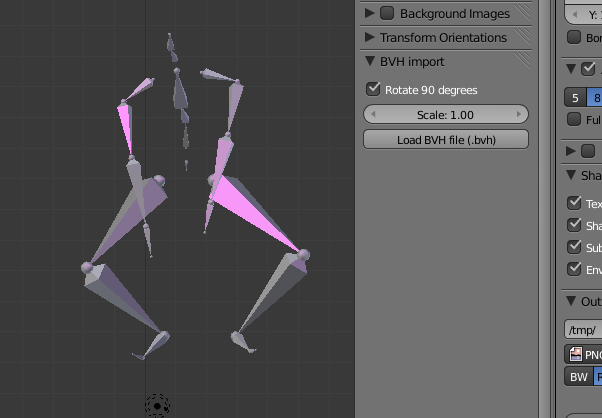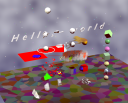Книга: Введение в написание скриптов на Питоне для Блендера 2.5x. Примеры кода
Простой импорт BVH-файлов
Простой импорт BVH-файлов
BVH формат обычно используется для передачи анимации персонажей, например, от данных захвата движения (mocap). Эта программа простого импортера BVH, которая строит скелет с действием (action), описанный в файле BVH. Он реализован в виде аддона Блендера со словарём bl_info в верхней части файла и кодом регистрации в конце.
После выполнения скрипта или включения его в качестве аддона, простой импортер BVH может быть вызван из панели пользовательского интерфейса (Ctrl+N). Есть две опции: логическая переменная с информацией о том, повернуть ли меш на 90 градусов (чтобы направить Z вверх), и масштаб.
Эта программа также показывает, как вызвать диалог выбора файлов, нажав кнопку на панели. Класс кнопки Load BVH наследуется от двух базовых классов bpy.types.Operator и ImportHelper.
class OBJECT_OT_LoadBvhButton(bpy.types.Operator, ImportHelper):
Класс ImportHelper (возможно, недокументированный) определяет некоторые атрибуты, которые используются для фильтрации файлов, отображающихся в диалоге выбора файлов.
filename_ext = ".bvh"
filter_glob = bpy.props.StringProperty(default="*.bvh", options={'HIDDEN'})
filepath = bpy.props.StringProperty(name="File Path",
maxlen=1024, default="")
Существует аналогичный класс ExportHelper, который ограничивает имеющийся выбор файлов экспорта.

#----------------------------------------------------------
# File simple_bvh_import.py
# Simple bvh importer
#----------------------------------------------------------
bl_info = {
'name': 'Simple BVH importer (.bvh)',
'author': 'Thomas Larsson',
'version': (1, 0, 0),
'blender': (2, 5, 7),
'api': 34786,
'location': "File > Import",
'description': 'Simple import of Biovision bvh',
'category': 'Import-Export'}
import bpy, os, math, mathutils, time
from mathutils import Vector, Matrix
from io_utils import ImportHelper
#
# class CNode:
#
class CNode:
def __init__(self, words, parent):
name = words[1]
for word in words[2:]:
name += ' '+word
self.name = name
self.parent = parent
self.children = []
self.head = Vector((0,0,0))
self.offset = Vector((0,0,0))
if parent:
parent.children.append(self)
self.channels = []
self.matrix = None
self.inverse = None
return
def __repr__(self):
return "CNode %s" % (self.name)
def display(self, pad):
vec = self.offset
if vec.length < Epsilon:
c = '*'
else: c = ' '
print("%s%s%10s (%8.3f %8.3f %8.3f)" %
(c, pad, self.name, vec[0], vec[1], vec[2]))
for child in self.children:
child.display(pad+" ")
return
def build(self, amt, orig, parent):
self.head = orig + self.offset
if not self.children:
return self.head
zero = (self.offset.length < Epsilon)
eb = amt.edit_bones.new(self.name)
if parent:
eb.parent = parent
eb.head = self.head
tails = Vector((0,0,0))
for child in self.children:
tails += child.build(amt, self.head, eb)
n = len(self.children)
eb.tail = tails/n
(trans,quat,scale) = eb.matrix.decompose()
self.matrix = quat.to_matrix()
self.inverse = self.matrix.copy()
self.inverse.invert()
if zero:
return eb.tail
else:
return eb.head
#
# readBvhFile(context, filepath, rot90, scale):
#
Location = 1
Rotation = 2
Hierarchy = 1
Motion = 2
Frames = 3
Deg2Rad = math.pi/180
Epsilon = 1e-5
def readBvhFile(context, filepath, rot90, scale):
fileName = os.path.realpath(os.path.expanduser(filepath))
(shortName, ext) = os.path.splitext(fileName)
if ext.lower() != ".bvh":
raise NameError("Not a bvh file: " + fileName)
print( "Loading BVH file "+ fileName )
time1 = time.clock()
level = 0
nErrors = 0
scn = context.scene
fp = open(fileName, "rU")
print( "Reading skeleton" )
lineNo = 0
for line in fp:
words= line.split()
lineNo += 1
if len(words) == 0:
continue
key = words[0].upper()
if key == 'HIERARCHY':
status = Hierarchy
elif key == 'MOTION':
if level != 0:
raise NameError("Tokenizer out of kilter %d" % level)
amt = bpy.data.armatures.new("BvhAmt")
rig = bpy.data.objects.new("BvhRig", amt)
scn.objects.link(rig)
scn.objects.active = rig
bpy.ops.object.mode_set(mode='EDIT')
root.build(amt, Vector((0,0,0)), None)
#root.display('')
bpy.ops.object.mode_set(mode='OBJECT')
status = Motion
elif status == Hierarchy:
if key == 'ROOT':
node = CNode(words, None)
root = node
nodes = [root]
elif key == 'JOINT':
node = CNode(words, node)
nodes.append(node)
elif key == 'OFFSET':
(x,y,z) = (float(words[1]), float(words[2]), float(words[3]))
if rot90:
node.offset = scale*Vector((x,-z,y))
else:
node.offset = scale*Vector((x,y,z))
elif key == 'END':
node = CNode(words, node)
elif key == 'CHANNELS':
oldmode = None
for word in words[2:]:
if rot90:
(index, mode, sign) = channelZup(word)
else:
(index, mode, sign) = channelYup(word)
if mode != oldmode:
indices = []
node.channels.append((mode, indices))
oldmode = mode
indices.append((index, sign))
elif key == '{':
level += 1
elif key == '}':
level -= 1
node = node.parent
else:
raise NameError("Did not expect %s" % words[0])
elif status == Motion:
if key == 'FRAMES:':
nFrames = int(words[1])
elif key == 'FRAME' and words[1].upper() == 'TIME:':
frameTime = float(words[2])
frameTime = 1
status = Frames
frame = 0
t = 0
bpy.ops.object.mode_set(mode='POSE')
pbones = rig.pose.bones
for pb in pbones:
pb.rotation_mode = 'QUATERNION'
elif status == Frames:
addFrame(words, frame, nodes, pbones, scale)
t += frameTime
frame += 1
fp.close()
time2 = time.clock()
print("Bvh file loaded in %.3f s" % (time2-time1))
return rig
#
# channelYup(word):
# channelZup(word):
#
def channelYup(word):
if word == 'Xrotation':
return ('X', Rotation, +1)
elif word == 'Yrotation':
return ('Y', Rotation, +1)
elif word == 'Zrotation':
return ('Z', Rotation, +1)
elif word == 'Xposition':
return (0, Location, +1)
elif word == 'Yposition':
return (1, Location, +1)
elif word == 'Zposition':
return (2, Location, +1)
def channelZup(word):
if word == 'Xrotation':
return ('X', Rotation, +1)
elif word == 'Yrotation':
return ('Z', Rotation, +1)
elif word == 'Zrotation':
return ('Y', Rotation, -1)
elif word == 'Xposition':
return (0, Location, +1)
elif word == 'Yposition':
return (2, Location, +1)
elif word == 'Zposition':
return (1, Location, -1)
#
# addFrame(words, frame, nodes, pbones, scale):
#
def addFrame(words, frame, nodes, pbones, scale):
m = 0
for node in nodes:
name = node.name
try:
pb = pbones[name]
except:
pb = None
if pb:
for (mode, indices) in node.channels:
if mode == Location:
vec = Vector((0,0,0))
for (index, sign) in indices:
vec[index] = sign*float(words[m])
m += 1
pb.location = (scale * vec - node.head) * node.inverse
for n in range(3):
pb.keyframe_insert('location', index=n, frame=frame, group=name)
elif mode == Rotation:
mats = []
for (axis, sign) in indices:
angle = sign*float(words[m])*Deg2Rad
mats.append(Matrix.Rotation(angle, 3, axis))
m += 1
mat = node.inverse * mats[0] * mats[1] * mats[2] * node.matrix
pb.rotation_quaternion = mat.to_quaternion()
for n in range(4):
pb.keyframe_insert('rotation_quaternion',
index=n, frame=frame, group=name)
return
#
# initSceneProperties(scn):
#
def initSceneProperties(scn):
bpy.types.Scene.MyBvhRot90 = bpy.props.BoolProperty(
name="Rotate 90 degrees",
description="Rotate the armature to make Z point up")
scn['MyBvhRot90'] = True
bpy.types.Scene.MyBvhScale = bpy.props.FloatProperty(
name="Scale",
default = 1.0,
min = 0.01,
max = 100)
scn['MyBvhScale'] = 1.0
initSceneProperties(bpy.context.scene)
#
# class BvhImportPanel(bpy.types.Panel):
#
class BvhImportPanel(bpy.types.Panel):
bl_label = "BVH import"
bl_space_type = "VIEW_3D"
bl_region_type = "UI"
def draw(self, context):
self.layout.prop(context.scene, "MyBvhRot90")
self.layout.prop(context.scene, "MyBvhScale")
self.layout.operator("simple_bvh.load")
#
# class OBJECT_OT_LoadBvhButton(bpy.types.Operator, ImportHelper):
#
class OBJECT_OT_LoadBvhButton(bpy.types.Operator, ImportHelper):
bl_idname = "simple_bvh.load"
bl_label = "Load BVH file (.bvh)"
# From ImportHelper. Filter filenames.
filename_ext = ".bvh"
filter_glob = bpy.props.StringProperty(default="*.bvh", options={'HIDDEN'})
filepath = bpy.props.StringProperty(name="File Path",
maxlen=1024, default="")
def execute(self, context):
import bpy, os
readBvhFile(context, self.properties.filepath,
context.scene.MyBvhRot90, context.scene.MyBvhScale)
return{'FINISHED'}
def invoke(self, context, event):
context.window_manager.fileselect_add(self)
return {'RUNNING_MODAL'}
#
# Registration
#
def menu_func(self, context):
self.layout.operator("simple_bvh.load", text="Simple BVH (.bvh)...")
def register():
bpy.utils.register_module(__name__)
bpy.types.INFO_MT_file_import.append(menu_func)
def unregister():
bpy.utils.unregister_module(__name__)
bpy.types.INFO_MT_file_import.remove(menu_func)
if __name__ == "__main__":
try:
unregister()
except:
pass
register()
- Резервное копирование многофайловых баз данных
- Восстановление из резервных копий многофайловых баз данных
- СТРУКТУРА ПРОСТОЙ ПРОГРАММЫ
- Создание файлов с блокировкой
- ПРИМЕР ПРОСТОЙ ПРОГРАММЫ НА ЯЗЫКЕ СИ
- Рекомендуемое расширение для файлов баз данных - *.ib
- Создание многофайловой базы данных
- Правила именования файлов
- Глава 6 Файловые системы
- 3.4 Сетевая файловая система
- 6.4 Другие файловые системы
- 6.5 Файловая система NTFS




